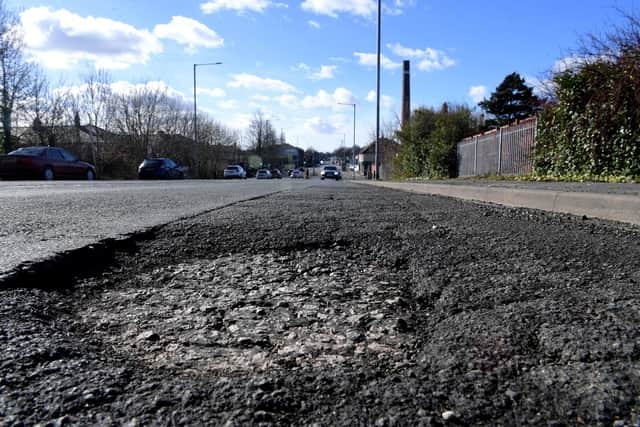Here's the reason why Preston, Chorley and South Ribble have so many potholes at the moment
and live on Freeview channel 276
Lancashire County Council’s cabinet member for highways says the authority is experiencing “significant and unprecedented reports of structural defects” across its road network.
Rupert Swarbrick also told a County Hall cabinet meeting that groundwater levels in some areas were forcing repair material out of potholes that had already been filled in.
Advertisement
Hide AdAdvertisement
Hide AdWater seeping into the surface of carriageways is the main cause of potholes – but wet weather also makes them difficult to fix.


New figures show the county council was falling short of some of its own targets for the time taken to repair potholes at the end of last year.
In the three months to December, the authority filled in 70 percent of highway defects classed as urgent within the two-day timeframe it sets for itself – but the target is 90 percent. Meanwhile, 83 percent of non-urgent issues were put right within 10 days, again against a 90 percent target.
However, the county council did manage to repair 99 percent of defects assessed as needing ‘emergency’ attention within a four-hour target time.
Advertisement
Hide AdAdvertisement
Hide AdActing Labour opposition group leader Jennifer Mein accused the authority of missing some of its pothole targets “quite severely”.
Although data showing its performance for the first two months of this year has not yet been published, County Cllr Swarbrick’s comments indicated that the service was still under pressure. He noted that it had rained on 71 of the last 93 days in Lancashire.
“Fixing potholes on wet days isn’t good and it makes our job very difficult to do,” he explained. However, he held out some hope for fed-up motorists.
“We are catching up now and this last week has seen a significant amount of additional activity. So you’ll find over the next few weeks, as the weather dries up, we will be catching up with that backlog,” County Cllr Swarbrick said.
Advertisement
Hide AdAdvertisement
Hide AdThe cabinet meeting heard that three roving teams of “find-and-fix” repair workers had recently been deployed.
Members also approved the advertising of a four-year contract for a company to carry out a pothole repair technique known as “spray injection patching”. The £2.4m deal will bolster the county council’s in-house repair team.
The injection technique has been used on Lancashire’s roads since 2012 and involves blasting carriageway cavities with compressed air to remove any debris and then spray-coating the surface of the hole with a bitumen emulsion before blasting asphalt into it. The process is self-compacting, meaning it needs no additional bedding down.
Asked by Cllr Mein whether the method ensured “a permanent job”, County Cllr Swarbrick said that was always the intention with pothole repairs.
Advertisement
Hide AdAdvertisement
Hide AdHowever, he warned that “very high groundwater” in the west of the county – particularly Fylde and Wyre – was posing further problems in the perennial pothole battle.
“The groundwater has actually been coming up from the bottom of the potholes and lifting the repairs out – and there’s nothing we can do to stop that, we just have to keep going back to make them good.
“But I’ve been and seen the process myself and it’s as good a system as we can come up with at the moment,” he added.
Pothole repair performance – and the investment opposition parties claim is needed to improve it – was once again one of the main talking points at County Hall’s budget-setting meeting last month.
Advertisement
Hide AdAdvertisement
Hide AdThe cabinet has now agreed the 88 pre-planned road resurfacing scheme it intends to carry out over the year ahead, at a cost of £15.2m.
Meanwhile £10m has been set aside for repairing potholes and defects as they appear – although, as the Lancashire Post revealed this week, that budget could be exceeded in order to meet the authority’s safety commitment to fixing all potholes over 40mm in depth. The county council repairs shallower potholes than that only if they are considered to be a significant risk to the public.
